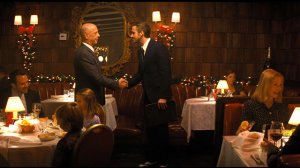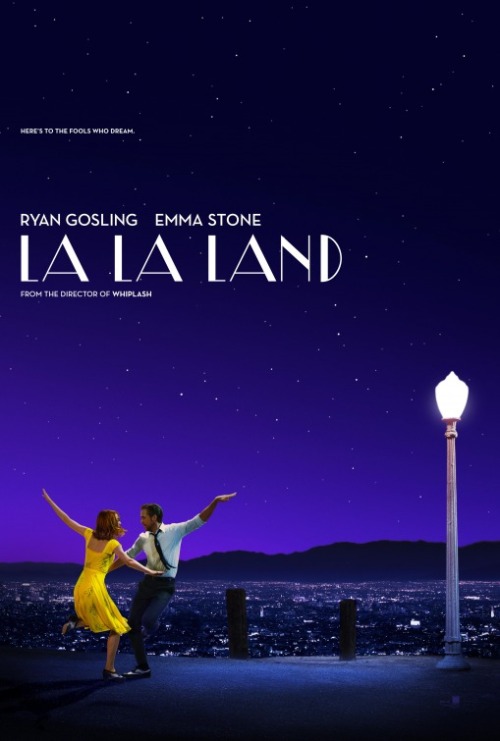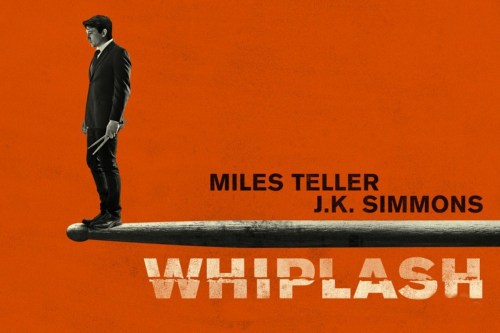Star Rating: 4.5/5
Director:
- Damien Chazelle – Whiplash
Cast:
- Emma Stone – Friends With Benefits, The Help, The Amazing Spiderman I & II, Birdman, Battle of the Sexes
- Ryan Gosling – Blue Valentine, The Ides of March, Only God Forgives, The Big Short, First Man
- JK Simmons – Spiderman I-III, The Words, Whiplash, Terminator Genisys, The Batman
- Josh Pence – The Social Network, Battleship, The Dark Knight Rises, Gangster Squad, Will Wilson
- John Legend
- Sonoya Mizuno – Ex Machina, Alleycats, Beauty and the Beast
Music Composer:
- Justin Hurwitz – Whiplash
Damien Chazelle announced himself to the world two years ago with aplomb. Since Whiplash left cinemas, viewers have waited patiently to see what he would do next. Well, now, Chazelle has returned with La La Land and it is another masterpiece.

Mia (Emma Stone), an aspiring actress, working as a barista in between auditions at a coffee shop along the Hollywood boulevard.
La La Land is predominantly about Mia (Emma Stone) and Sebastian (Ryan Gosling). Both live in Hollywood and are struggling to make their dreams come true. She is an aspiring actress, working as a barista to pay bills; and he is a jazz piano player, doing the odd gig here and there to make ends meet. They bump into each other a few times and a romantic relationship blossoms. But is their relationship compatible with their careers?
La La Land is a delightful musical drama. It is an unashamed throwback to Hollywood’s lost golden era and it is full of radiant joy. Everyone is happy and they frequently break into song and dance to show the world how happy they are. (If anything, the characters are too happy and this grates on the nerves. Nothing is seriously wrong in their lives and money is never a problem, even though both of the main characters lack funds.)

Bill (JK Simmons), the owner of a restaurant, telling Sebastian (Ryan Gosling) to just play Christmas themed piano pieces and not the jazz tunes that Sebastian likes to play.
In many ways, La La Land is the polar opposite of Whiplash. Whereas Whiplash was intense, with the passion and pace of a boxing thriller, La La Land is laid back and blissful. Yet, it shares the jazzy elements of Whiplash as well as the desire of its characters to fulfill their ambitions, regardless of the price. The issue of compromise is key throughout both films, and it is interesting to see which direction the characters decide to go in La La Land when they are confronted with the junction of their careers on the one hand and their relationship on the other.
The reasons we have no idea which way the characters will go is, one, because of the tone of the film; and, two, because of the acting and chemistry of the two main characters: Emma Stone and Ryan Gosling. The good-looking pair have worked well together before in Crazy, Stupid, Love and Gangster Squad, but La La Land is undoubtedly their best collaboration to date. Their characters are clichéd, but Emma Stone shows a solid range of emotional skills and also that she can sing decently too (Gosling less so).
However, the two real stars of La La Land are Justin Hurwitz and Damien Chazelle. First, hats off to Hurwitz: his score is wondrous. The music he created for Whiplash was terrific, but this is another level; especially, as the range of jazz in La La Land is extraordinary. Even if one does not like jazz in general, one will love it in this film thanks to Hurwitz.

Sebastian and Mia happily dancing (as everyone is wont to do in La La Land), while looking lovingly into each other’s eyes.
And then there is director Chazelle. What can one say? He is proving himself to be quite a talent. His understanding of directing, editing, cinematography and choreography is exemplary. He also seems to love what he does and this shines through in every scene. Long may it continue!
Over-all, La La Land is a spell-binding musical drama. It is happy-clappy, but it is charming and its two leads perform really well together. Additionally, the music is gorgeous. Nevertheless, it is Damien Chazelle who steals the limelight. More than anything, he proves with La La Land that Whiplash was not a one-off marvel and that, at the tender age of 32, he is on the right road to a distinguished career.
PG’s Tips























